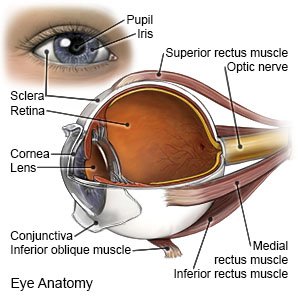Eye (Visual) Floaters
Medically reviewed by Drugs.com. Last updated on Sep 1, 2024.
What are eye floaters?
Eye floaters are specks or spots in your vision. They are dark and may look like squiggly lines, cobwebs, or strings. These spots or specks move around in your field of vision. The floaters seem to drift or dart away if you try to look straight at them. Eye floaters are also called visual floaters.
What causes eye floaters?
Floaters may be caused by tiny particles of debris or blood that float in the vitreous. The vitreous is the gel that fills most of your eye. As you age, the vitreous shrinks and pulls away from the retina. The retina is the thin layer that lines the back of your eye. When this happens, the tissue becomes stringy and casts a shadow on the retina. These shadows can cause you to see floaters. Floaters may also be caused by problems with the retina.
 |
What increases my risk for eye floaters?
- Aging
- Nearsightedness (trouble seeing things far away)
- Inflammation inside the eye, sometimes caused by infection
- Medical conditions, such as diabetes or high blood pressure
- Eye injuries or cataract surgery
- Problems with the retina
How are eye floaters diagnosed?
Your healthcare provider will examine your eyes and check your vision. Your provider may dilate your eyes to see the vitreous and the back of your eyes more clearly.
How are eye floaters treated?
Most floaters come and go, and do not require treatment. Surgery may be needed if you have so many floaters you cannot see well.
How can I protect my eyes?
- Get annual eye exams. Your ophthalmologist or optometrist will examine your eyes and test your vision.
- Wear a hat and sunglasses when you are outdoors. Make sure the sunglasses have ultraviolet (UV) protection lenses to protect your eyes.
- Manage your health conditions. See your provider regularly if you have a health condition that may affect your vision, such as diabetes or high blood pressure.
When should I seek immediate care?
- You suddenly see more floaters, or flashing lights.
- You have a loss of vision, or a change in your vision.
When should I call my doctor?
- You start to see more floaters over time.
- You have eye pain or blurred vision, or light hurts your eyes.
- You have questions or concerns about your care.
Care Agreement
You have the right to help plan your care. Learn about your health condition and how it may be treated. Discuss treatment options with your healthcare providers to decide what care you want to receive. You always have the right to refuse treatment. The above information is an educational aid only. It is not intended as medical advice for individual conditions or treatments. Talk to your doctor, nurse or pharmacist before following any medical regimen to see if it is safe and effective for you.© Copyright Merative 2024 Information is for End User's use only and may not be sold, redistributed or otherwise used for commercial purposes.
Further information
Always consult your healthcare provider to ensure the information displayed on this page applies to your personal circumstances.
